
Notion Review 2026
Notion Project Management Plans & Pricing
Notion Comparison
Expert Review
Pros
Cons
Notion Project Management's Offerings
Notion offers four distinct plans: Free, Plus, Business, and Enterprise.
I found that each plan builds upon the previous one, adding more storage capacity, support, and scalable features for evolving teams.
Free Plan
Ideal for individuals and small projects, the Free plan offers unlimited storage with a 5MB file upload limit. It includes a collaborative workspace, templates, databases, and integrations with Slack and GitHub. Users also get basic page analytics, a 7-day page history, and the ability to invite up to 10 guests.
Plus Plan
At $10 per seat/month, the Plus plan removes file size limits and extends guest access. It includes everything in the Free plan, plus unlimited blocks for teams, 30-day page history, 100 guests, custom websites, custom automations, and synced databases with third-party apps. Users can also visualize data with charts and dashboards.
Business Plan
Designed for larger teams, the Business plan costs $15 per seat/month and adds advanced permissions and private team spaces. It includes everything in Plus, along with SAML SSO, bulk PDF export, advanced page analytics, 90-day page history, client pages, and support for up to 250 guests.
Enterprise Plan
For large-scale teams, the Enterprise plan offers enhanced security, scalability, and control. Pricing is custom-based, and it includes everything in Business, plus user provisioning (SCIM), advanced security controls, audit logs, a dedicated customer success manager, workspace analytics, unlimited page history, and security compliance integrations.
Customer Support
Notion offers various support options to help users get the most out of the PM software. All users have access to the Help Center, community forums, and in-depth guides. Paid plans come with priority support for faster response times, while Enterprise users get a dedicated Customer Success Manager for personalized assistance.
- Live chat: Requesting help from Support took me directly to a helpful AI chatbot. I was able to request correspondence with a human in a few clicks.
- Support Request: This is the major way to reach out to support. I filled out the support form as directed by the chatbot and got a helpful response via email in 7 hours.
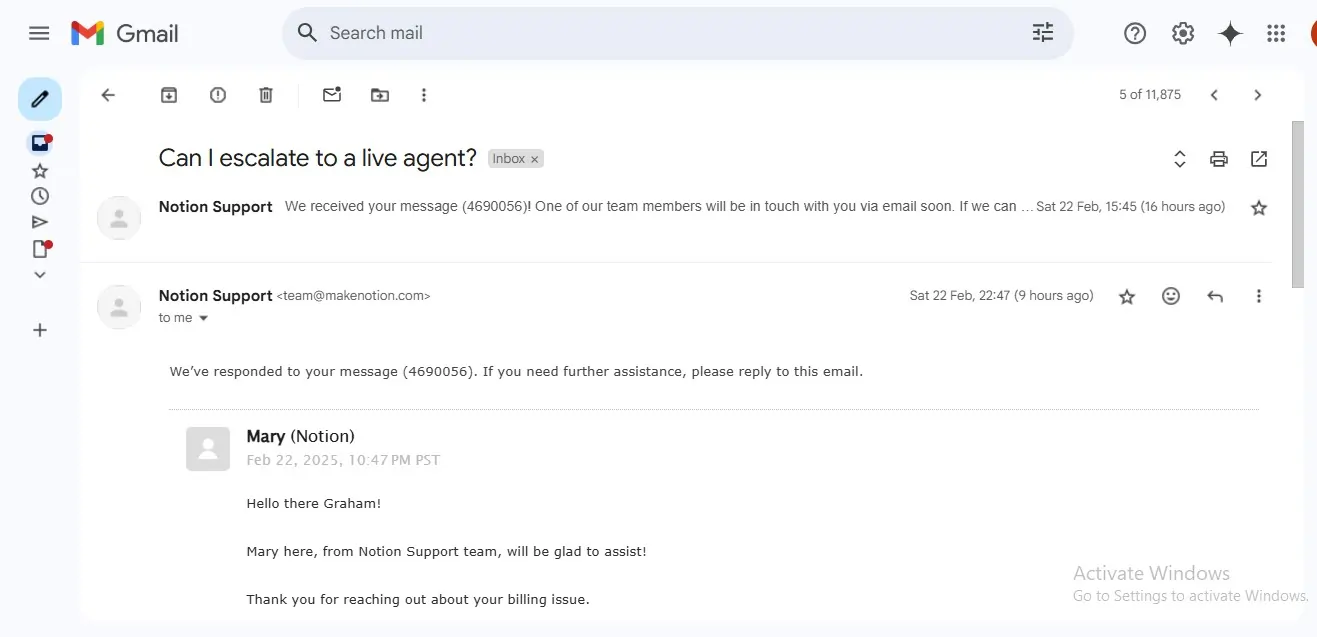
- Email: Notion has an official email for technical or product support at team@makenotion.com. However, my emails did not receive a response at the time of writing this review.
- Customer Success Manager: Enterprise plan users seeking personalized assistance can reach out to their assigned Customer Success Manager for dedicated support.
- Help, tutorials, and documentation: Notion provides a rich trove of resources for learning and troubleshooting, including FAQs, video tutorials, and more.
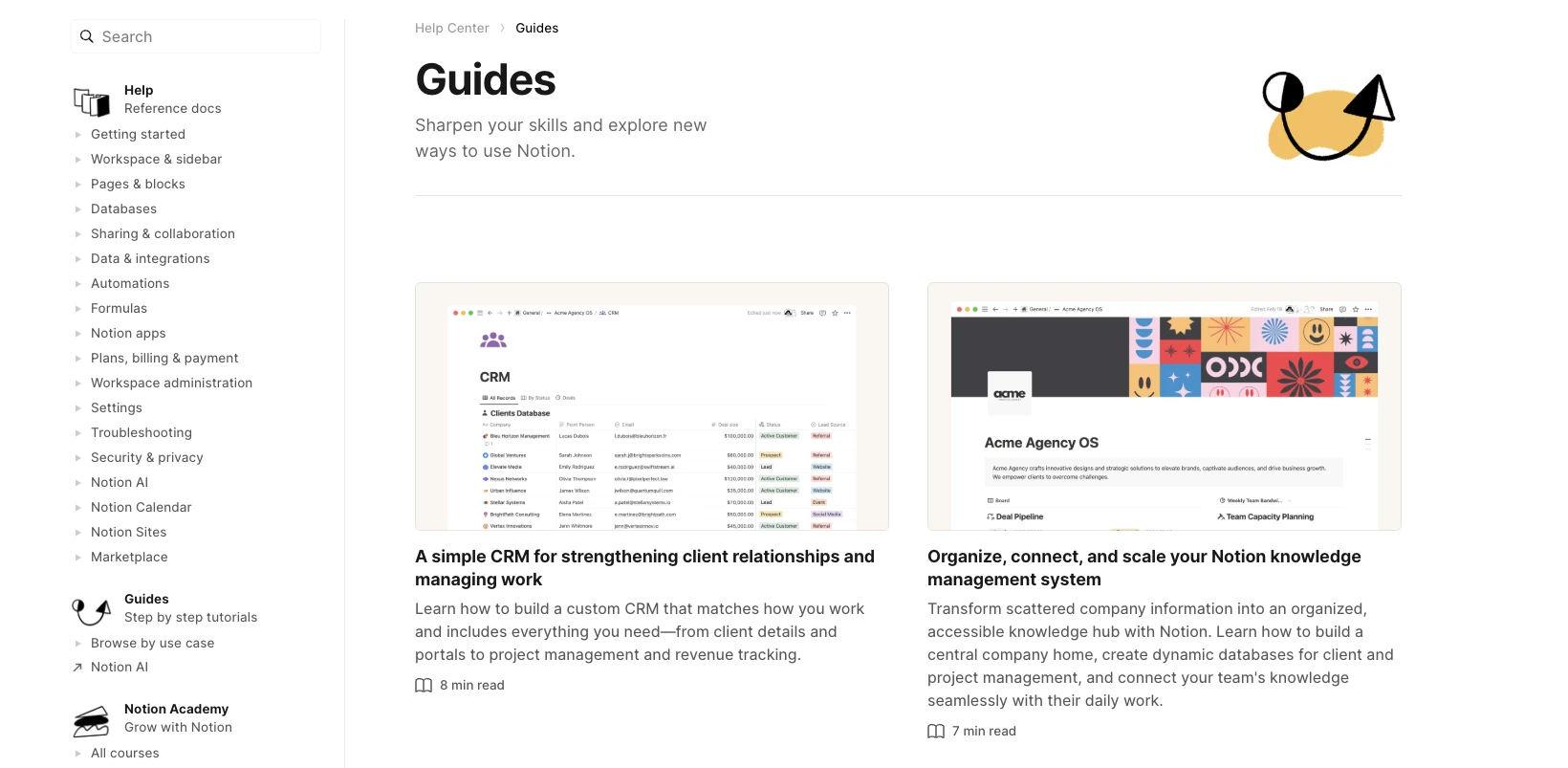
Notion community
For builder apps, the best resource is always fellow builders. Notion has the largest community of builders. Thousands of active Notion users gather on these community-hosted forums to trade tips, answer questions, meet virtually, and share creations. These forums are not hosted, sponsored, or moderated by Notion, but are full of valuable content for you.
Features & Functionality
General Features
I tested out some of the features, and I’ll discuss them here:
- Databases
- Timeline view
- Calendar integration
- Templates
- Customization
- Task management
- Team collaboration tools
- File sharing and document management
- Guest access
- Kanban Boards
- Customizable dashboards
- Notifications and alerts
- Mobile app support
- Third-party integrations (Slack, Google Drive, etc.)
- API access for customization
- Storage Included
Task & Project Tracking Features
Databases:
I played around with this feature and was able to set up projects with custom fields for deadlines, priority, and status. Each database can be a collection of tasks with customized properties. This allows teams to organize work efficiently and ensure critical details are always accessible.
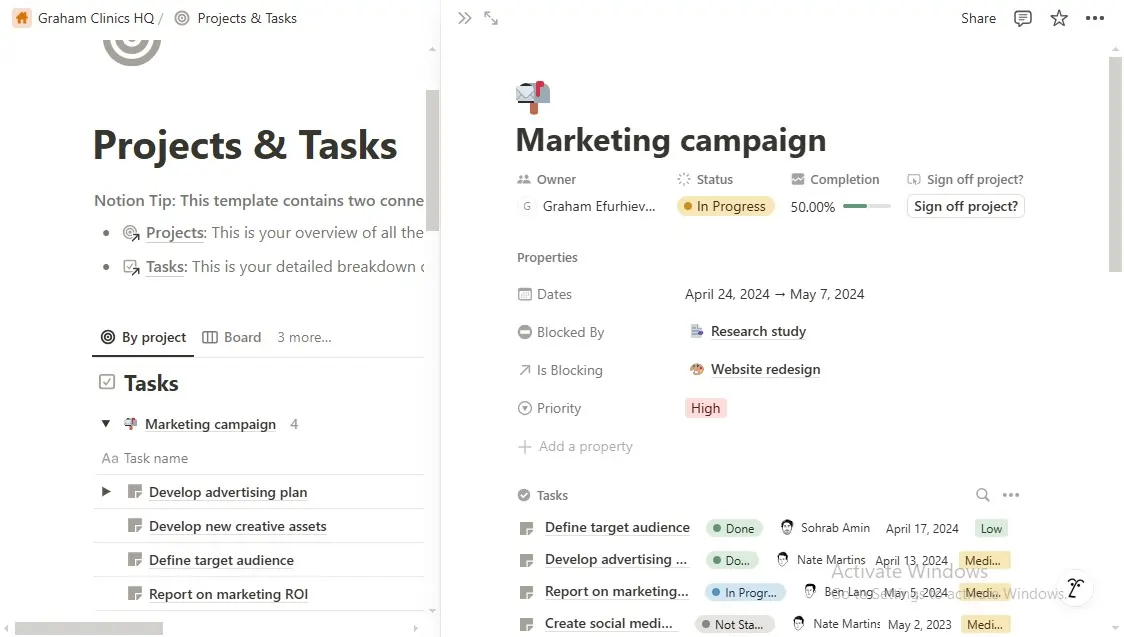
Timeline View
This can work similarly to a Gantt chart, showing tasks over a time range. I added properties like task owners, deadlines, and dependencies, but these dependencies are not automatic like in other project management software.
Nonetheless, it helps teams visualize project timelines and plan workloads effectively.
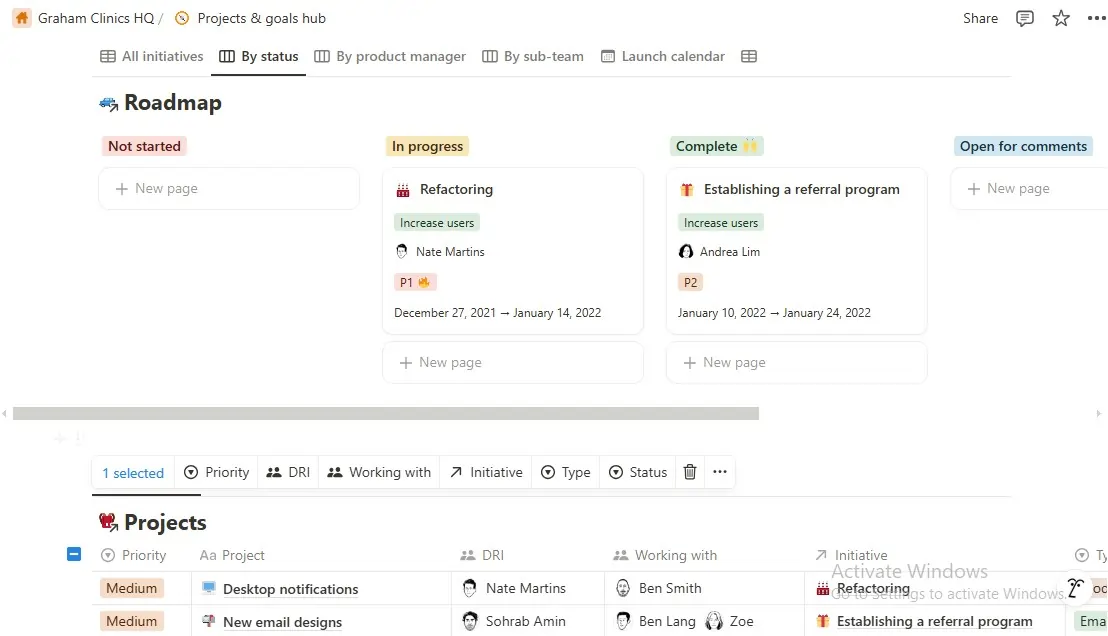
Calendar Integration
You can display tasks in a native calendar view, but there’s no deep integration with Google Calendar or Outlook. You can embed a Google Calendar link, but it won’t sync both ways natively.
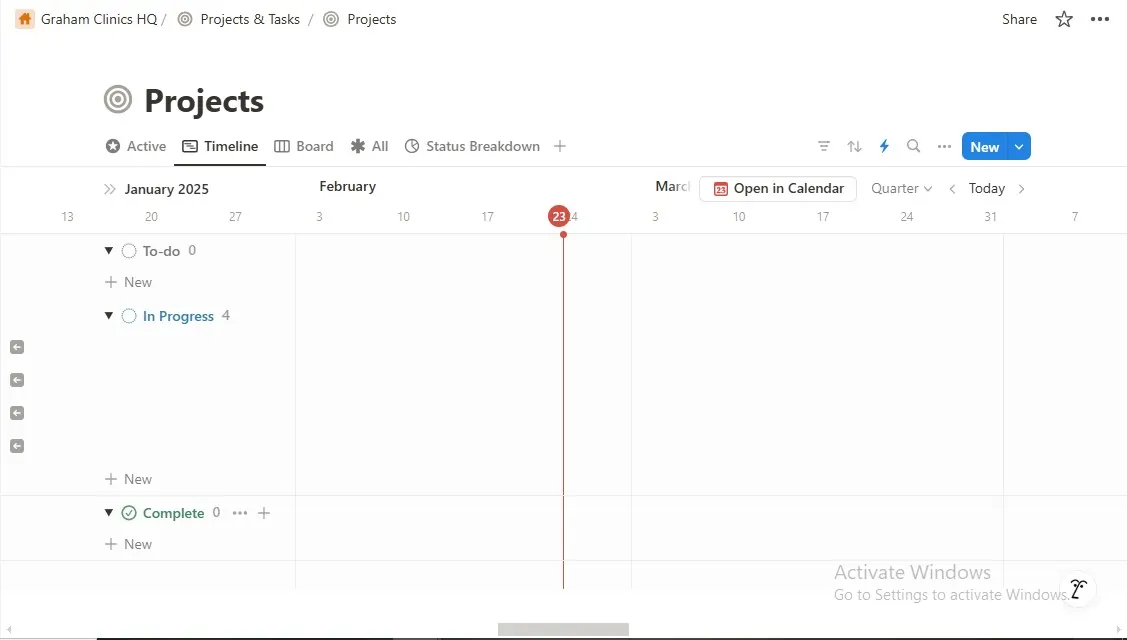
Templates
Notion does not offer native recurring task automation like some other project management tools. I had to build those manually with formulas and templates.
Notion templates function as a form of workflow automation, allowing users to create reusable structures that streamline repetitive tasks.
Although it lacks the dynamism of other project management software, the template system helps standardize processes and reduce manual work.
Collaboration & Communication Features
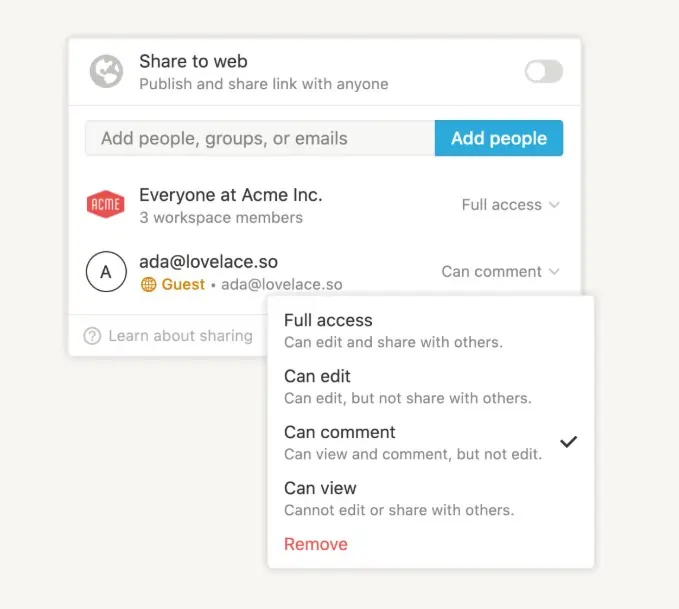
Native communication
You can comment on pages, tag teammates, and track changes. However, Notion lacks real-time chat and built-in discussion threads, so you’ll still need a tool like Slack (which Notion works perfectly with).
This makes it ideal for asynchronous collaboration but requires additional tools for instant messaging.
File Sharing and Document Management
Notion is solid for team-wide documentation and file sharing, especially with unlimited storage. You can upload files, images, and PDFs.
Real-time Editing
I tried this out with my colleagues and multiple users were able to update pages simultaneously. You can see who’s editing with Google Docs.
Changes appear instantly, with real-time syncing across all devices. This ensures teams stay aligned and can collaborate on documents without delays.
Guest Access
I was able to share specific pages with external users (clients, contractors, or stakeholders) without giving them full workspace access or a full onboarding. Business & Enterprise plans allow more extensive guest collaboration within the project management software.
This makes it easy to involve external partners without compromising internal workflows.
Kanban Boards
I was then able to create customizable Kanban boards with custom properties, tags, and filters with which to sort your tasks and databases. However, there’s no automation for moving tasks between statuses.
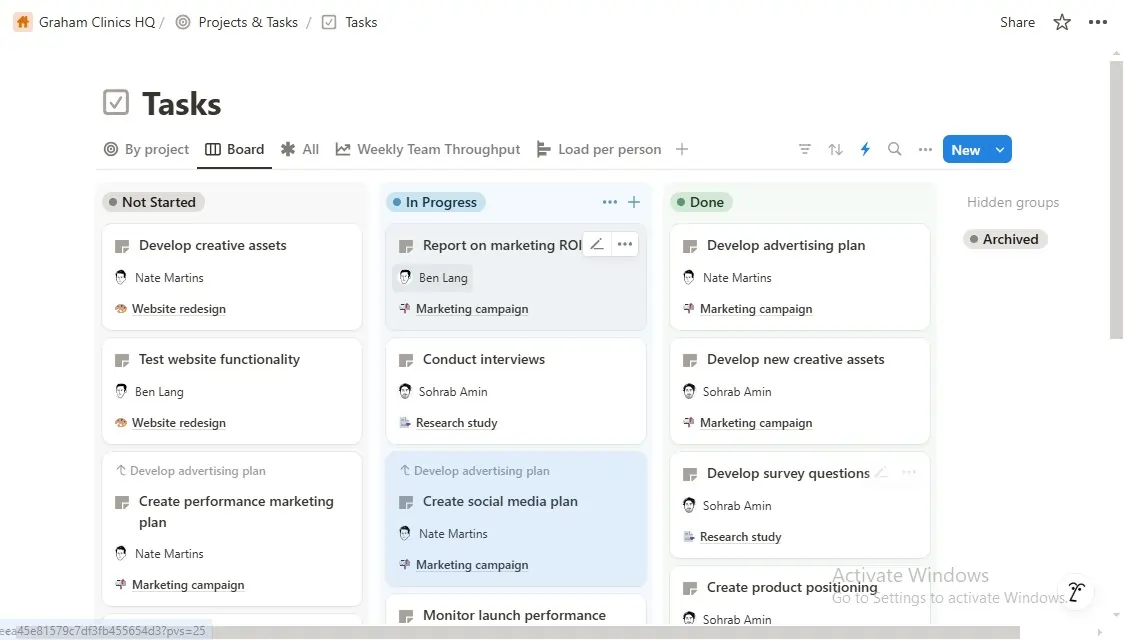
Customizable Dashboards
This is where Notion falls short of the best project management software. You can build custom dashboards using linked databases, but it’s all manual. There are no built-in analytics, graphs, or auto-generated reports. It’s all DIY.
Notifications and Alerts
Notion has simple, non-intrusive notifications, but it’s not a particularly strong alert system. Notifications appear in the Notion app, via email, and on mobile (push notifications) and are usually for task assignments or comments.
API & Third-Party Integrations
Notion works with Slack and GitHub, but for most integrations, you’ll need Zapier, Make, or API workarounds. They also provide API access for customization. It allows data retrieval and updates but lacks deeper automation and webhook triggers.
Storage Included
Notion offers unlimited storage, but with a catch—file uploads are capped at 5MB per file for free users. Paid plans remove this restriction. This isn’t a replacement for Google Drive or Dropbox, but it’s decent for storing work related files.
Mobile App Support: The Notion mobile app is well-designed but way less powerful than the desktop version. It is available on iOS and Android, with real-time sync across devices. It works offline, but syncing can be inconsistent
Communication
Enhance team collaboration with integrated communication features.
Performance:
Notion lets you build your own task-tracking system, unlike other project management software that usually has one ready. Customization is in-depth and hurdle-free.
I could build my workflows using databases, templates, and relations and was able to structure tasks however I wished, but I had to set it up myself.
Notion’s task management is not as structured as dedicated project management tools. You can create and assign tasks in to-do lists, Kanban boards, and databases, but there’s no built-in automation or advanced dependency tracking.
Notion does not support recurring tasks out of the box like other project management tools.
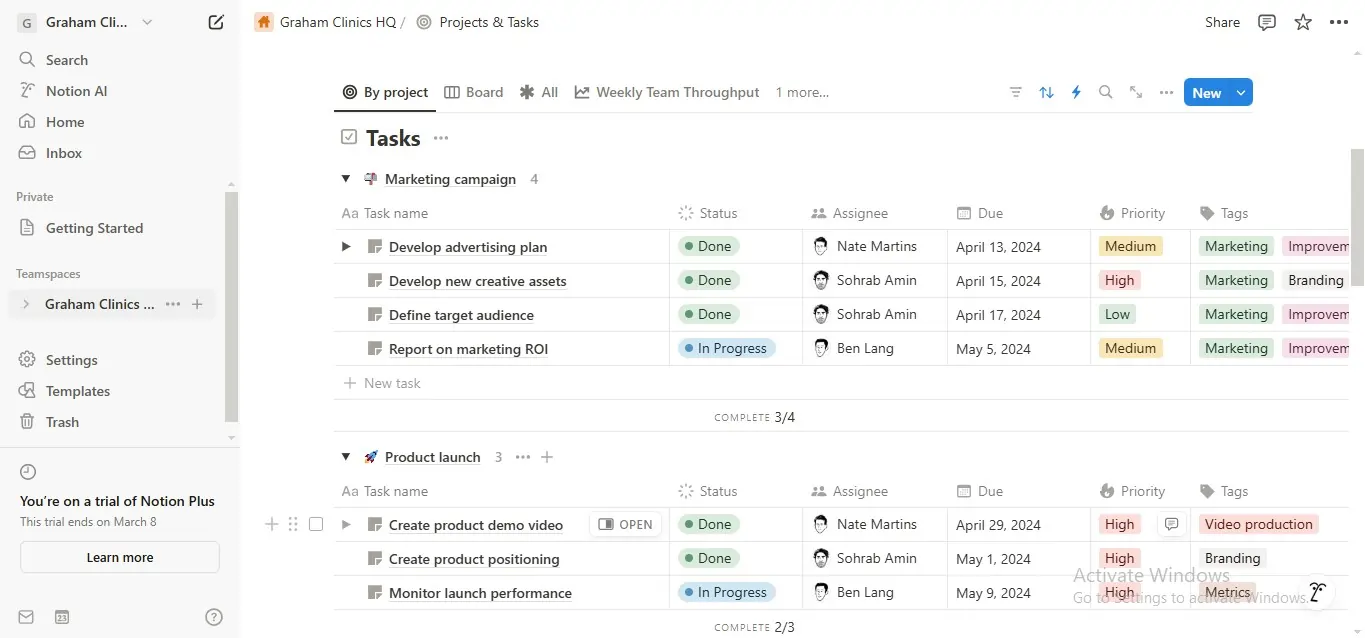
Collaboration and communication are smooth, but there’s no built-in chat.
I was able to embed comments and use @mentions to keep discussions organized. If your tasks are documentation-heavy, and you want a flexible, all-in-one platform for project management, notion is great. Notion integrates well with Slack, Google Calendar, and a few other apps, but you’ll need third-party tools like Zapier for deeper automation.
One downside to Notion is its speed. Launch speed is notoriously slow. There are tweaks to improve, but everything takes 3 seconds if you’re working with a large dataset. This is not uncommon even with the best project management software, but is still unpleasant to deal with.
Ease Of Use:
UI experience is a priority with the best project management software. I found Notion’s interface to be fluid and modern, even when I started adding databases, links, and embeds.
The minimalist approach makes it easy to look at, but some important features are hidden behind unobvious menus.
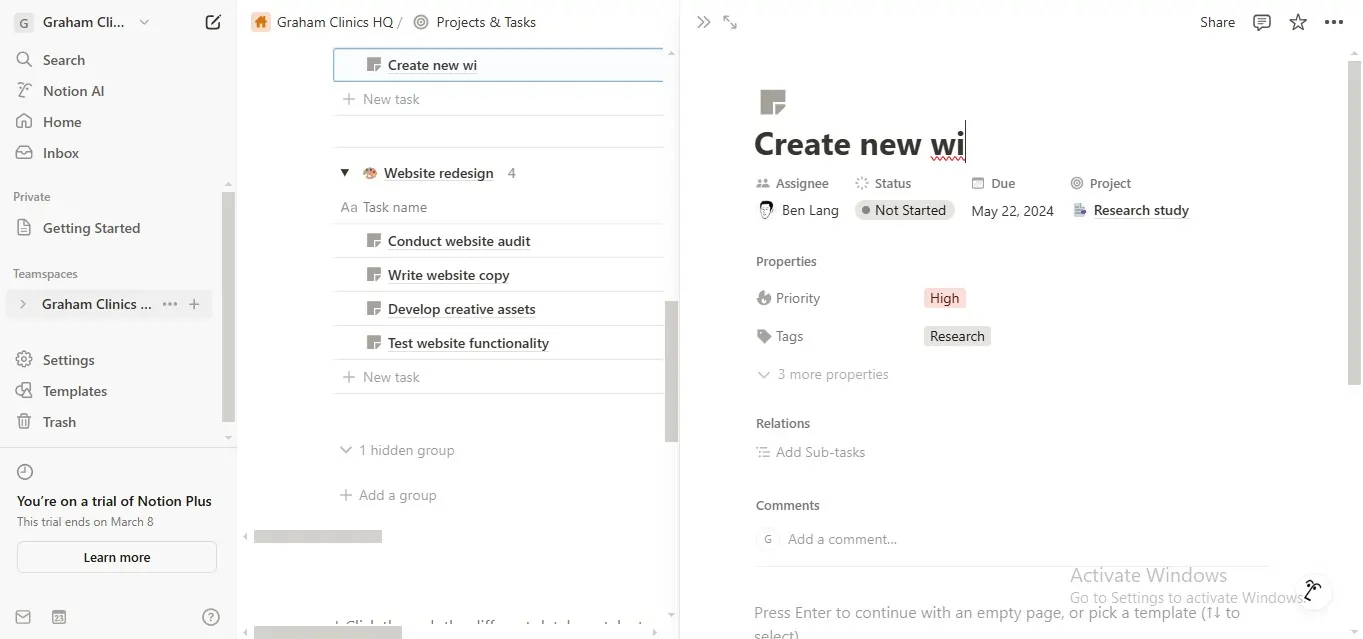
Because of its scope, it’s not the easiest tool to pick up. Notion gives you a blank slate, which is great for customization but underwhelming for new users. Expect a learning curve. If you’re not into tinkering, it can feel frustrating at first.
Customization is where Notion wins. You can turn it into a to-do list, a full project tracking software, or even a company wiki.
But that freedom means you have to build your workflow from scratch, which isn’t ideal for users who just want to dive in and start working. Setup takes time. There are templates to be used, but they’re often basic, requiring extra tweaking to fit your needs.
Verdict:
Notion is a highly flexible workspace for project management, but expect to build much of your system from scratch. If you need structured workflows, automation, or deep reporting, Notion may feel manual and limiting. However, if your tasks are documentation-heavy and you prefer a customizable all-in-one platform for project management, Notion excels.
I would say it is the best project management software for small businesses and individuals who need a centralized but lightweight hub for tasks, notes, and collaboration. Designers and creatives who thrive on flexibility and custom organization will love the unlimited storage.